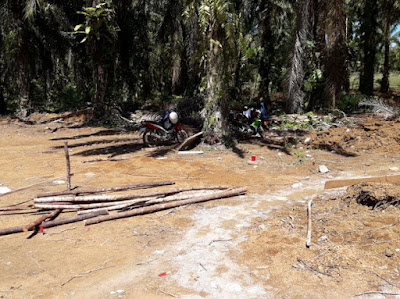Land Normalization for Rice Field
Having Speculation with the Government's
Loyal Promise
The country vision to
achieve food self-sufficiency makes the
government do various breakthroughs such as to normalize irrigation channels, to
build water dams, and to expand the rice fields. It is not surprising that
when the government officers visit villages, there will be always completed
with big harvesting moment and opening officially reservoirs and dams. We
all pray and support the efforts so that this goal of food self-sufficiency
will be really achieved.
On the contrary,
currently the majority of farmers in North Bengkulu plant vegetable crops. They
are reluctant to cultivate unprofitable rice as the past experience gave them a
fact that they always lost with rice
field. The government does not guarantee the availability of fertilizer and the
absence disrupts the growth of the plant. Frequently farmers lose and they
are forced to divert vegetable plants (including rice) to crops (oil
palm). Honestly, they grow oil palm and rubber in rice fields that should
be planted with vegetable and rice. However, their family's economic condition
improves.
The growing plantation with
monoculture models brings impact in which environmental activists show data on
environmental damage caused by the development of oil palm
plantations. The most obvious is the loss of biodiversity that triggers
the declining quality of land and the emergence of pests and plant
diseases. Social problems then also follow, such as, land-use license,
land acquisition and compensation, and many others. The impacts should be a
review to make next policies and efforts, especially for land normalization
plans.
In mid-April 2017, feeling
unrest was felt among plantation farmers in North Bengkulu. From several information
sources obtained, such as, from a resident working on the Ministry of Agriculture
project and from a worker of rice fields normalization project in Muko-Muko
District, it was found that the government planned to dismantle palm plantation
in Muko-muko regency (the northern regency in Bengkulu Province) that its
function had been switched from rice field into plantation. The data shows
that the land area to be normalized in Bengkulu province reaches 1,850 hectares, of
which 1,200 hectares are located in Muko-muko.
 In the midst of such
anxiety, the government reassures the farmers by giving a guarantee of
irrigation and maintaining fertilizer supply for farmers. Based on the
socialized calculations, it is found that growing rice is actually more
profitable than growing oil palm and rubber. The calculation is as follows; for
one hectare of rice (assuming minimal pests and the availability of fertilizer
and running water) farmers can earn Rp 64,000,000 per year. Meanwhile, by
planting rubber and oil palm, farmers earn between Rp 28.000.000,- to Rp
32.000.000,-only. For this comparison, the farmers becomes aware that the
benefits will be greater if the farmers cultivate their land with vegetable
plants and rice. Why are people shifting vegetable crops to oil palm and
rubber even if the yield is less than rice? Rubber and palm give them a
definite income.
In the midst of such
anxiety, the government reassures the farmers by giving a guarantee of
irrigation and maintaining fertilizer supply for farmers. Based on the
socialized calculations, it is found that growing rice is actually more
profitable than growing oil palm and rubber. The calculation is as follows; for
one hectare of rice (assuming minimal pests and the availability of fertilizer
and running water) farmers can earn Rp 64,000,000 per year. Meanwhile, by
planting rubber and oil palm, farmers earn between Rp 28.000.000,- to Rp
32.000.000,-only. For this comparison, the farmers becomes aware that the
benefits will be greater if the farmers cultivate their land with vegetable
plants and rice. Why are people shifting vegetable crops to oil palm and
rubber even if the yield is less than rice? Rubber and palm give them a
definite income.
Furthermore, enthusiastic
citizens abruptly responded to the normalization of the land, they immediately
plant their land with rice even though the palm trees have not been dismantled
from their land. Future time will prove whether the government keeps the
promise to guarantee irrigation, the availability of fertilizer, or whether the
farmer will become just the market object for fertilizer, seed and pesticide. Moreover,
optimism needs to be grown to keep working on the land, water and air in this
country. (YDA)



Comments
Post a Comment